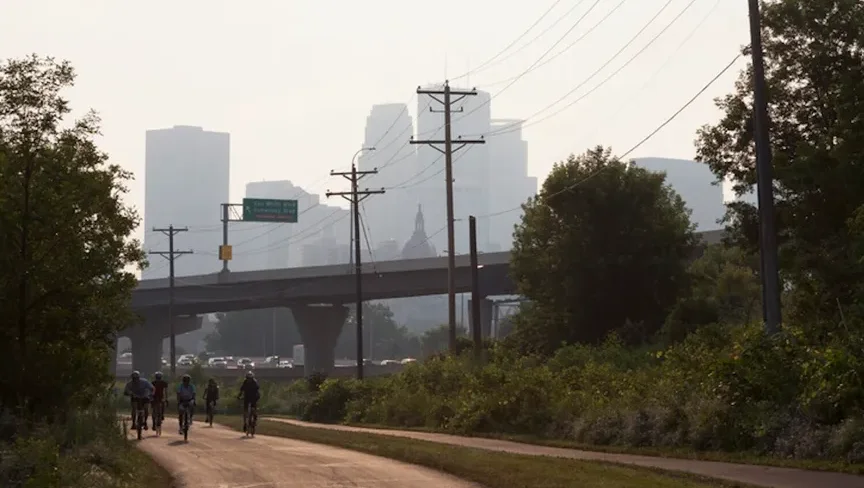
The city of Minneapolis is retooling a decade-old partnership with its gas and electric utilities in response to criticism that it hasn’t done enough to help the city reach its climate goals.
The Clean Energy Partnership was established in 2014 as part of the city’s last round of utility franchise agreements with Xcel Energy and CenterPoint Energy. The agreements authorize utilities’ use of public right-of-way, often in exchange for fees or meeting other terms or conditions from the city.
A little over a decade ago, Minneapolis was among the first U.S. cities to view utility franchise agreements as a potential tool to leverage for climate action. Some advocates at the time had been pressuring the city to study creating a municipal utility to accelerate clean energy, and the partnership emerged as a compromise to give the city more say in the utilities’ operations.
Former City Council member Cam Gordon, who represented southeast Minneapolis in 2014 when the council approved the partnership, is one of the critics who say the initiative “never realized its potential.” Instead, it mainly served as “a government relations and promotional PR tool to allow [elected officials] and the utilities to feel like we’re doing something,” he said.
The City Council is set to approve new franchise agreements this week, and they include an updated memorandum of understanding for the Clean Energy Partnership that will require regular reporting on key performance indicators, new utility-specific emission goals, energy conservation, and service reliability in disadvantaged neighborhoods.
Spokespeople for both companies said they welcome the planned changes and that the agreement reflects their interest in working with city leaders on shared clean energy goals.
Since the partnership went into effect in 2015, it has brought together representatives of the utilities, the City Council, and the mayor’s office once per quarter to talk about efforts to reduce emissions in the city. Clean energy advocates and other stakeholders sit on an advisory committee but do not have a formal seat on the partnership’s governing board.
Minneapolis City Council Vice President Aisha Chughtai, who represents the council on the partnership board, expressed frustration about the lack of follow-through from utilities. “Sitting in a meeting and nodding along is one thing. Changing your actions is another,” she said.
By the partnership’s own measures, it has failed to make significant progress on five out of the city’s seven major climate goals. The city is on track with its target to eliminate greenhouse gas emissions from municipal operations but behind pace with its goals related to citywide, residential, commercial, or industrial emissions.
Going forward, the partnership board will continue to meet quarterly, but instead of revolving around city climate goals, each utility will be expected to hit specific targets within Minneapolis’s borders. CenterPoint will commit to reducing emissions from natural gas use by at least 20% by 2035 compared with 2021.
“I think it’s progress,” said council member Katie Cashman, who represents an area west of downtown. The gas utility’s target is “a very meager, insufficient goal, but it is a goal nonetheless, and they haven’t done this in any other city.”
CenterPoint agreed to send a more senior executive to attend the quarterly partnership meetings, though Xcel did not. The utilities also rejected the city’s proposal to hire an outside administrator to manage the partnership.
City leaders believe the new agreement does a better job of setting expectations, but Minneapolis will still lack formal leverage over the utilities if they fail to make progress. The agreement does not contain any penalties for failure to follow through, and the next window to renegotiate isn’t until 2035 when the franchise agreement comes back up for renewal.
Luke Hollenkamp, the city’s sustainability program coordinator, said data reported through the partnership allows the city to make course corrections in its climate work.
“We can see what’s working, what’s not working, and also see where we need to invest more time,” he said.
Xcel Energy’s spokesperson said the partnership has led to successes, noting that citywide emissions from electricity have declined and that Minneapolis met its goal of powering city operations with 100% renewable electricity in 2023 by participating in Xcel’s Renewable*Connect program.
CenterPoint said it has invested nearly $61 million in energy efficiency programs in Minneapolis since 2017, saving residents $25 million in energy costs while reducing 245,000 metric tons of emissions. The utility also developed an on-bill financing program advocated by clean energy activists and others.
Despite the partnership’s imperfections, current and former city officials said it’s better to keep it in place as part of the new franchise agreements than to let it dissolve.
“We’re ramping up our trajectory [to cut emissions],” Cashman said. “We’re setting an example of how other cities can lead on climate action.”
The City Council’s climate and infrastructure committee approved the new agreements on Feb. 6; the full council is set to vote on them Feb. 13.